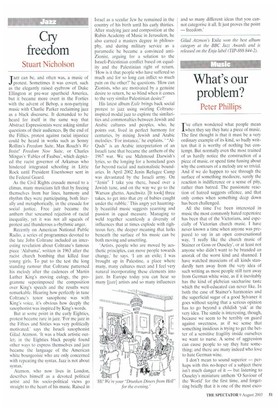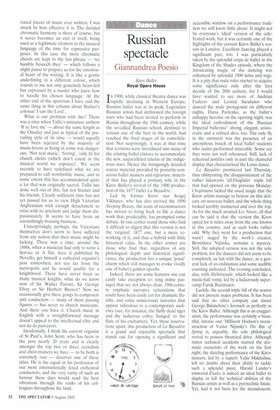What's our problem?
Peter Phillips
I've often wondered what people mean when they say they hate a piece of music. The first thought is that it must be a very ordinary example of its kind, so badly written that it is worthy of nothing but contempt. But normally even the most trained of us hardly notice the construction of a piece of music, or spend time fussing about why the contours of a melody are so trivial. And if we do happen to see through the surface of something mediocre, surely the reaction is indifference or a sense of pity, rather than hatred. The passionate reaction of hatred suggests offence, and that only comes when something deep down has been challenged.
All the time I've been interested in music the most commonly hated repertoire has been that of the Victorians, and especially of Victorian church music. I have never known a time when anyone was prepared to say in an open conversational way. 'I really like the church music of Staineror Goss or Ouseley', or at least not anyone who didn't want to be branded an anorak of the worst kind and shunned. I have watched musicians of all kinds standardly turn away from the very idea of such writing as most people still turn away from German white wine, as if it inevitably has the kind of plebeian saccharine taste which the well-educated can never like. In both the case of Stainer's harmonies and the superficial sugar of a good Sylvaner it goes without saying that a serious opinion has to go beyond a childish 'yuk' at the very idea. The simile is interesting, though, because we seem to be terribly on guard against sweetness, as if we sense that something insidious is trying to get the better of a sensitive fragility inside ourselves we want to nurse. A sense of aggression can cause people to say they hate something; and there are many indeed who love to hate German wine.
I don't mean to sound superior — perhaps with this no-hoper of a subject there isn't much danger of it — but listening to Ouseley's miniature anthem '0 Saviour of the World' for the first time, and forgetting briefly that it is one of the most exco riated pieces of music ever written, I was struck by how effective it is. The derided chromatic harmony is there of course, but it never becomes an end in itself, being used as a legitimate element in the musical language of the time for expressive purposes. In this case the most chromatic chords are kept to the last phrase — 'we humbly beseech thee' — which follows a slight pause to prepare us for the emotional heart of the writing. It is like a gentle underlining in a different colour, which sounds to me not only genuinely heart-felt but expressed by a master who knew how to handle his chosen language. At the other end of the spectrum I have said the same thing in this column about Stainer's colossal 'I saw the Lord'.
What is our problem with this? There was a time when Tallis's miniature anthem 'If ye love me' — about the same length as the Ouseley and just as typical of the prevailing style of its time — would equally have been rejected by the majority of music-lovers as being in some way dangerous. 'Not real music', 'boring', 'only fit for church choirs (which don't count in the musical world we espouse)'. We seem recently to have redefined what we are prepared to call worthwhile music, and to some extent this has accommodated quite a lot that was originally sacred. Tallis has done well out of this, but not Stainer and his friends. Clearly sufficient time has not yet passed for us to view High Victorian Anglicanism with enough detachment to relax with its artefacts and judge them dispassionately. It seems to have been an astonishingly bruising business.
Unsurprisingly, perhaps, the Victorians themselves don't seem to have suffered from any notion that their music might be lacking. There was a time, around the 1880s, when a musician had only to write a Service in A flat, have it published by Novello, get himself a cathedral organist's post somewhere not too far from the metropolis and he would qualify for a knighthood. There have never been so many musical knights: what do we know now of Sir Walter Parratt, Sir George Elvey or Sir Herbert Brewer? Now we occasionally give these gongs to composers and conductors — many of them passing figures — but never to church musicians. And there you have it. Church music in English with a straightforward message doesn't appeal to the intellectual elite and nor do its purveyors.
Incidentally, I think the current organist of St Paul's, John Scott, who has been in the post nearly 20 years and is clearly amongst the top two or three recitalists and choir-trainers we have — to be both is extremely rare — deserves one of these titles. He is the equal in his profession of our most internationally feted orchestral conductors; and the very rarity of such an honour these days would send the best vibrations through the ranks of his colleagues throughout the land.



































































 Previous page
Previous page